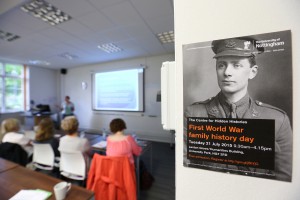What is a Hidden History in relation to the First World War? A day conference, ‘First World War family history day’, convened by the Centre for Hidden Histories, and held on 21 July at the University of Nottingham, was distinctly ‘revealing’.
 Hidden is, of course, a relative term. The IWM’s ‘Lives’ project is all about ‘finding’ the 8m or so men and women who were directly involved in the First World War. The records exist for many of these, but there has not been a previous attempt to bring the material together and to create individual profiles of each one, in a single place. The IWM’s project, ably discussed by Charlotte Cyzyzk, is an attempt to do just that, and to make sure that no one who played a substantive role, whether they were at the Western Front, whether they were killed, maimed, or escaped Scot free, is omitted. It is a vast undertaking, possible in practical terms only in the age of digital communication, but one which enables us to grasp the enormity of the war in terms of human cost.
Hidden is, of course, a relative term. The IWM’s ‘Lives’ project is all about ‘finding’ the 8m or so men and women who were directly involved in the First World War. The records exist for many of these, but there has not been a previous attempt to bring the material together and to create individual profiles of each one, in a single place. The IWM’s project, ably discussed by Charlotte Cyzyzk, is an attempt to do just that, and to make sure that no one who played a substantive role, whether they were at the Western Front, whether they were killed, maimed, or escaped Scot free, is omitted. It is a vast undertaking, possible in practical terms only in the age of digital communication, but one which enables us to grasp the enormity of the war in terms of human cost.
Kurt Barling, who is Professor in Journalism at Middlesex University, introduced a rather different angle – the hidden family past of which he was unaware. Once he started to trace Barlings in the war graves of the Western Front his family history came to life. Kurt was a BBC journalist for many years, and made various films about his discoveries. Each one took him closer to individual Barlings, and each one helped him to rescue them from obscurity and to remember their past as part of his heritage. Such was his gathering interest, that Kurt even filmed (when he came across them unexpectedly) Commonwealth War Graves in Uganda. Even finding such gravestones in such an unexpected place (to us, not the Ugandans) was an enormous surprise.
 The Social Sisters from the Ramgarhia Sikh temple in Leicester, brought a further dimension to the discussion. The Sikhs were a warlike society, and the first group to travel to Europe following the outbreak of the war reached Marseilles as early as 26 September 1914. How many of us remember, or are even aware, of the contribution of troops, of different religious backgrounds, to the western front effort by soldiers from the Empire? One of the Social Sisters still has her grandfather’s uniform, and the group is collectively preparing a multi-panelled tapestry (on similar lines to the Bayeux Tapestry) setting out the contribution of their Sikh forefathers to the Imperial war in Europe. They are determined that the modern Sikh community should not forget the efforts made by their forefathers on behalf of the country in which they now live.
The Social Sisters from the Ramgarhia Sikh temple in Leicester, brought a further dimension to the discussion. The Sikhs were a warlike society, and the first group to travel to Europe following the outbreak of the war reached Marseilles as early as 26 September 1914. How many of us remember, or are even aware, of the contribution of troops, of different religious backgrounds, to the western front effort by soldiers from the Empire? One of the Social Sisters still has her grandfather’s uniform, and the group is collectively preparing a multi-panelled tapestry (on similar lines to the Bayeux Tapestry) setting out the contribution of their Sikh forefathers to the Imperial war in Europe. They are determined that the modern Sikh community should not forget the efforts made by their forefathers on behalf of the country in which they now live.